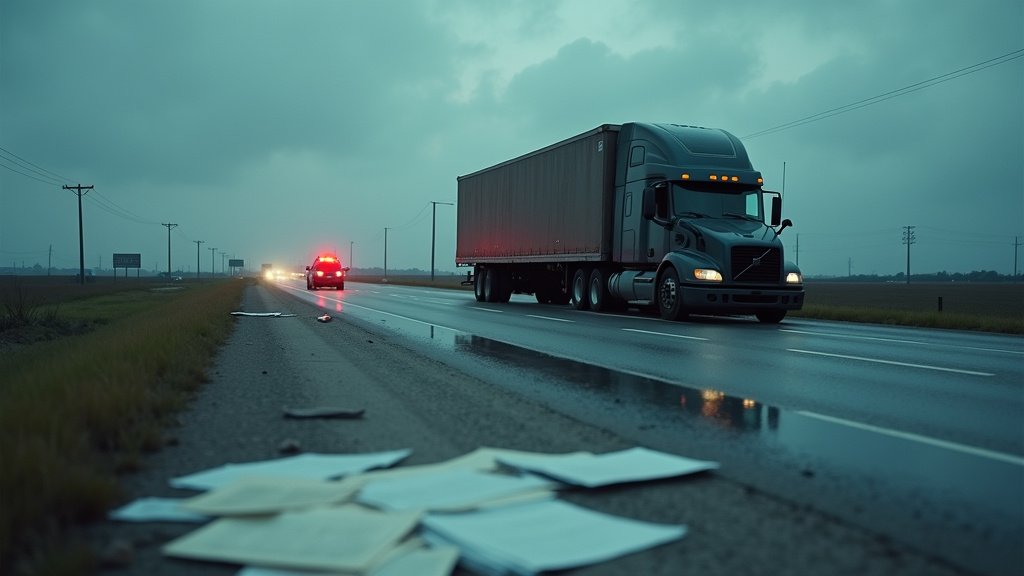A devastating multi-vehicle collision on the Florida Turnpike last week, which claimed the lives of three South Florida residents, has escalated into a major national headline as authorities reveal the semi-truck driver involved was an undocumented immigrant who obtained a commercial driver’s license in California. The tragedy has sparked intense scrutiny over state licensing policies for non-legal residents and reignited the contentious debate surrounding border security and immigration enforcement.
The Fatal Collision and Its Victims
The catastrophic crash occurred on Tuesday, August 12, 2025, just before 3:00 p.m. near Mile Marker 171 on the northbound lanes of Florida’s Turnpike in Fort Pierce, St. Lucie County. According to the Florida Highway Safety and Motor Vehicles (FLHSMV), a 2024 International semi-truck, driven by 28-year-old Harjinder Singh of Stockton, California, attempted a highly dangerous and illegal U-turn in an area designated for “official use only.” This reckless maneuver caused the truck’s trailer to block multiple northbound lanes, leaving no escape for oncoming traffic.
A Chrysler Town & Country minivan, unable to stop or swerve, tragically slammed into the truck’s trailer, becoming wedged underneath. The impact was fatal for all three occupants of the minivan. The 30-year-old driver from Florida City was airlifted to HCA Florida Lawnwood Hospital but later succumbed to his injuries. Two passengers, a 37-year-old woman from Pompano Beach and a 54-year-old man from Miami, were pronounced dead at the scene. Their identities have not been publicly released. Singh and his 25-year-old passenger, both from California, were reportedly unharmed in the incident.
Dashcam video footage from inside the semi-truck, capturing the harrowing moments leading up to the crash and Singh’s seemingly emotionless reaction, has circulated widely, further fueling public outrage.
The Driver’s Immigration Status and Licensing Journey
The subsequent investigation quickly unveiled Harjinder Singh’s precarious immigration status, shifting the focus of the news story beyond a routine traffic accident. Authorities with the U.S. Department of Homeland Security (DHS) confirmed that Singh entered the United States illegally from Mexico in 2018. He reportedly crossed the border near San Ysidro, California, without inspection and was arrested by Border Patrol two days later. Despite being processed for expedited removal, Singh claimed a fear of returning to India, which led to his release on a $5,000 immigration bond in January 2019, keeping him in pending immigration proceedings ever since.
A central point of contention in this trending case is how Singh managed to obtain a commercial driver’s license (CDL) in California in 2018 despite his undocumented status. California is one of 19 states, along with the District of Columbia, that issue driver’s licenses regardless of immigration status, a policy often supported as providing a lifeline for individuals to work and participate safely in daily life. However, critics argue such policies pose significant public safety risks, especially when it comes to commercial driving licenses.
Political Fallout and Calls for Accountability
The revelation of Singh’s immigration and licensing status immediately triggered a heated political firestorm. Florida Highway Safety and Motor Vehicles Executive Director Dave Kerner vehemently condemned the incident, stating, “The actions taken by the defendant while operating a commercial tractor-trailer are both shocking and criminal.” He also confirmed that upon the conclusion of his state charges, Singh will be deported.
White House spokeswoman Abigail Jackson and DHS Secretary Kristi Noem were quick to criticize California’s licensing policies. Secretary Noem posted on X, stating, “Three innocent people were killed in Florida because Gavin Newsom’s California DMV issued an illegal alien a Commercial Driver’s License. This gut-wrenching tragedy should have never happened.” A DHS spokesperson echoed this sentiment, calling the licensing of Singh “asinine.” Florida Governor Ron DeSantis also weighed in, emphasizing that Singh would face justice in Florida before deportation and that Florida authorities are working with the federal government to extradite him from California.
California Governor Gavin Newsom’s office, in turn, pushed back, asserting that Singh had obtained an employment authorization document while Donald Trump was president, implying federal responsibility in his ability to work legally in the U.S. However, some reports indicate Singh’s work authorization was initially rejected in 2020 under the Trump administration and later approved in June 2021 under the Biden administration.
Industry leaders have also expressed strong disapproval. American Trucking Associations (ATA) Chief Operating Officer Dan Horvath issued a statement calling the crash a “horrific tragedy that should never have happened.” He questioned how Singh was able to obtain a CDL, demanding answers from the state of California and highlighting concerns about fraudulent and non-compliant entities potentially fast-tracking CDL applicants with inadequate training. The ATA also reiterated its support for the Trump Administration’s efforts to audit CDL issuances nationwide and enforce English language proficiency standards.
Legal Proceedings and Broader Implications
Harjinder Singh has been arrested by U.S. Marshals in California on August 16 on a warrant for three counts of vehicular homicide. Each count is a second-degree felony under Florida law, potentially carrying a sentence of up to 15 years in prison. In addition to the criminal charges, Singh faces immigration violations, and U.S. Immigration and Customs Enforcement (ICE) has placed an I-247A detainer on him, ensuring his transfer to federal custody for deportation proceedings once his state charges are concluded.
This tragic event has not only resulted in devastating loss for the victims’ families but has also profoundly impacted the national discourse on immigration, public safety, and the contentious issue of state sovereignty versus federal enforcement in immigration matters. The ongoing investigation and the legal proceedings against Harjinder Singh are poised to remain a central focus, fueling the broader conversation on who should be allowed to obtain commercial licenses and operate vehicles on American roadways.





